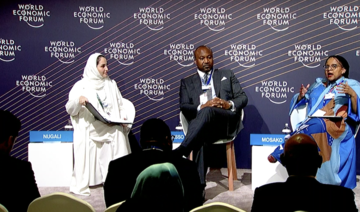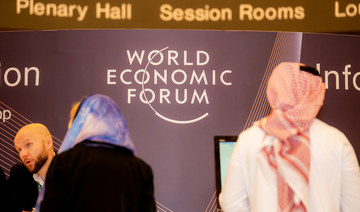PARIS: In striking the jewel of the French Riviera on a national holiday the truck attack on Nice delivered a new blow to France’s tourism sector already reeling from repeated terror attacks.
On Friday, several cultural events across France were canceled or postponed as a mark of respect for the 84 people killed when a gunman drove a 19-ton truck into a crowd of revellers following Bastille Day fireworks the previous evening.
President Francois Hollande declared the incident a “terrorist” attack.
The place of the attack was a top tourist destination: the palm-lined Promenade des Anglais along the Mediterranean coast in the city which is the number two destination in France behind Paris.
The attack was the third major strike against France in less than 18 months. It comes eight months after Daesh gunmen and suicide bombers attacked bars, restaurants, a concert hall and the national stadium in Paris, killing 130 people. In January last year 17 were killed in another attack at various sites including the offices of the Charlie Hebdo magazine and a Jewish supermarket in Paris.
Georges Panayotis, head of the MKG hotel and tourism consultancy, expressed concern about the effect the repeated attacks were having on the industry.
“This is no longer a classic terrorism situation where a couple of months is enough following an attack for economic activity to recover,” said Panayotis.
The successive attacks and high number of victims “will dissuade tourists for a certain time.”
The French government had just held this week its first meeting of a special government-industry committee headed by Foreign Minister Jean-Marc Ayrault to try to find ways to help the sector recover.
The number of tourists arriving on regular flights has fallen by 5.8 percent since January, including by 11 percent in Paris.
The number of hotel nights foreigners spend in Paris is expected to be down around 20 percent for the prime summer season, tourism minister Matthias Fekl said in a recent interview with TourMag.
The tourism industry is critically important for France, the world’s top tourism destination that welcomed nearly 84.5 million visitors last year. The sector accounts for 7 percent of the economy and directly and indirectly employs two million people.
Travel sector shares took a beating on Friday, including shares in hotel group AccorHotels and Europcar rental agency, which both fell around 4 percent in a Paris market down around 0.8 percent overall.
The attack on Nice may nip in the bud an increase in tourists to destinations outside Paris, which was partially supported by France’s successful hosting of the Euro 2016 football championships in June and July.
Tourist arrivals by plane outside of Paris were up by 11 percent in the first 10 days of July, thanks in part to a jump in last minute travelers from a number of European nations.
“We’ve had a flood of cancelations since last night,” said Denis Cippoloni, head of the hotel association in Nice.
“I went near the Promenade des Anglais this morning,” he said. “Usually it is lively and animated, but silence reigned.”
Organizers of several events that usually draw large numbers of tourists have changed their schedules.
At the 56th edition of the Jazz at Juan de Juan-les-Pins near Nice, a festival where the genre’s biggest stars have featured since it started in 1960, all concerts from Friday to Monday have been canceled.
And all events in the parallel Jazz Off festival, held on the streets of the same town and those of Antibes, have also been canceled.
Several firework displays planned for the weekend have been canceled or postponed.
Nice attack a new strike against French tourism
Nice attack a new strike against French tourism
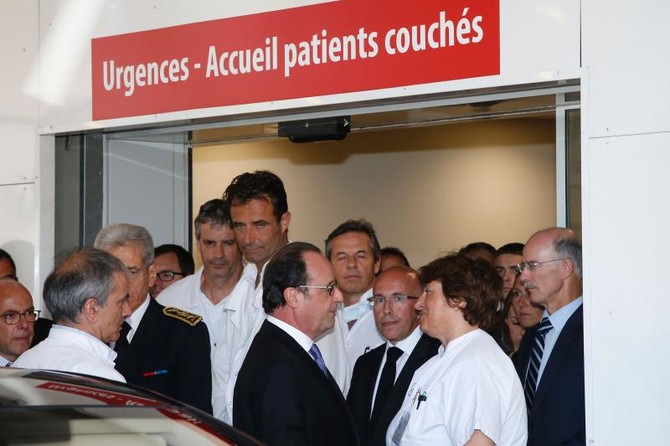
Saudi Arabia committed to preserving environment, water resources, minister tells WEF
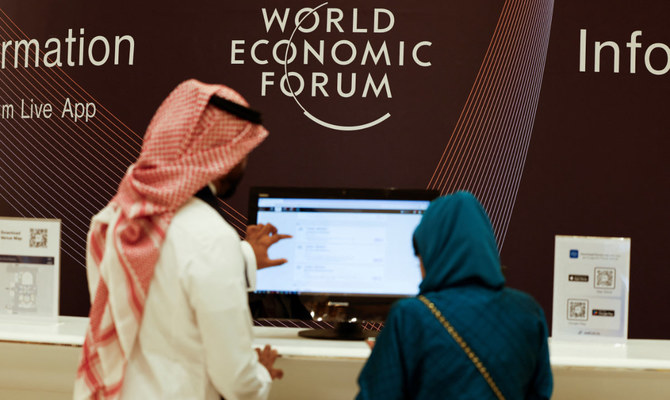
- Nation providing incentives for private sector to become more engaged, Abdulrahman Al-Fadley says
DUBAI: Saudi Arabia has detailed plans for the protection of its lands and environmental resources, the Minister of Environment, Water and Agriculture said on Sunday.
Speaking at the World Economic Forum in Riyadh, Abdulrahman Al-Fadley said: “We have devised our plans based on the preservation of our environment and the management of our water resources. The Kingdom is also providing incentives for the private sector to become more engaged and more responsible toward the environment.”
With 40 percent of lands around the world degraded and further degrading at an alarming rate, critical action is needed as the UN Convention to Combat Desertification COP16 is set to take place in Riyadh in December.
Al-Fadley said Saudi Arabia had preserved millions of hectares of land and set up programs for cloud seeding and increasing the number of dams in the country.
“This will not only be beneficial to the Kingdom but for the whole region,” he said. “With us hosting COP16 we are hoping to give the meeting the importance it commands. We don’t want matters to go back to the status quo after COP16 ends.”
Tariq Al-Olaimy, a member of the Global Shapers Community Foundation Board at the WEF, commended King Salman for his land restoration efforts.
“When you put nature first, you are equally putting people first,” he said. “Nature is our greatest collaborator … There is no successful growth story without successful land restoration and this starts inwardly, through our religion, community, values and moral clarity.”
Ibrahim Thiaw, secretary of the UNCCD, warned of global repercussions if the world did not pay heed to environmental safekeeping.
“Entire ecosystems are being destroyed through actions and inactions,” he said. “There has been a 29 percent increase in droughts in the past few years and that is affecting 1.8 billion people around the world. For poor nations that is disastrous and carries a large death toll of animals, people and agriculture. We have to be more proactive and not just emergency-ready. We must attempt to avoid emergencies.”
Thiaw said the Panama Canal’s functionality had been reduced by 12 percent, which was causing a problem for supplies.
“Demand is increasing while resources are shrinking,” he said. “As humanity we have been looking at resources as if they are unlimited. We have not been managing them. Companies need to reset their relationship with nature and we need to focus on land restoration to keep going.”
Naoki Ishii, director of the Center for Global Commons, had similar concerns.
“We are on a collision course,” he said. “The only solution is to modify our economic system. COP16 must be transformative for all of us. We need the political momentum to implement positive changes.
“If we are able to push those efforts, economically and ideally speaking, that will be a game changer.”
Saudi Arabia, UAE have world’s most ambitious decarbonization programs: WEF panel
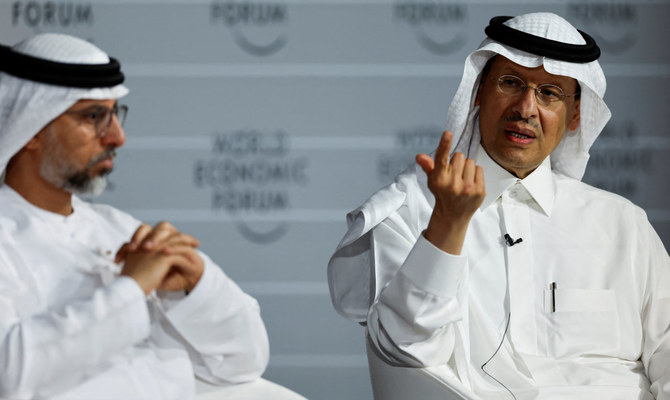
- “Solving sustainability problems requires technology and China has contributed greatly by increasing technical progress and making the cheapest energy available to the world”
DUBAI: A panel of ministers and experts gathered at the World Economic Forum in Riyadh on Sunday to discuss the road map for tripling renewables by 2030.
The UAE’s Minister of Energy and Infrastructure Suhail Mohamed Al-Mazrouei said his country’s goal would not only be reached but possibly exceeded by 2030.
“The UAE has been offering solar power to aid the world in reaching the goal of tripling renewables,” he said. “We have very few years until 2030, we need to work alongside and encourage countries to make the achievement by then.”
Li Zhenguo, president of Longi Green Energy Technology, said the Chinese government had been at the forefront of efforts to develop renewables.
“In 2023, China installed 216 solar power plants, which is more than 50 percent of the global capability,” he said.
“Solving sustainability problems requires technology and China has contributed greatly by increasing technical progress and making the cheapest energy available to the world.”
Marco Arcelli, CEO of Saudi-based ACWA Power, said he was surprised by the momentum in the region.
“Saudi and UAE have the most ambitious decarbs programs in the world. There is a speed and dimension you don’t see much elsewhere,” he said.
“There is leadership with a vision, there is cheap energy available and I believe you will start seeing greenshoring in the Kingdom by 2030. Lots of upcoming projects in the country, be it NEOM or others, will be solar driven and using renewable energy.”
Kuwait’s Minister of Electricity, Water and Renewable Energy Salem Alhajraf said there was a need to increase global production capacity.
“Innovative financing is key,” he said. “We need to move from small giga-sized projects to deploying renewables. Cities or towns with small populations can possibly have all their needs met by solar power.”
Stephanie Jamison, global Resources Industry Practices chair at Accenture, said her company had been developing guidelines for community engagement and nature transition.
“By conducting surveys and interviewing various CEOs, it has become clear that companies understand the impact they are making on nature. And so, partnerships between companies and proactive partnerships between companies and the community is one way to tackle challenges.”
Saudi energy minister, EU official discuss cooperation on clean energy
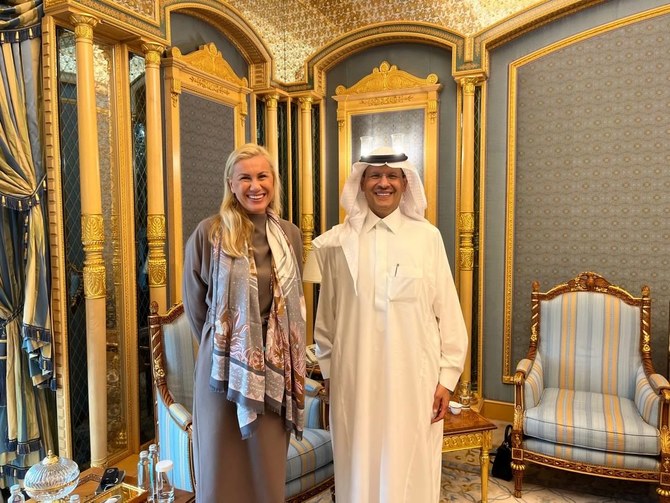
RIYADH: Saudi Energy Minister Prince Abdulaziz bin Salman on Sunday held talks with EU Energy Commissioner Kadri Simson to discuss prospects for cooperation in the field of clean energy.
The top officials met on the sidelines of the World Economic Forum in the Saudi capital, the Saudi Press Agency reported. They discussed ways to strengthen bilateral ties, boost cooperation for the promotion of green energy and advance the goals of the Paris Agreement and ensure the implementation of the outcomes of the COP28 held in Dubai last year.
The Paris Agreement is an international treaty on climate change that was adopted back in 2015. It was negotiated by 196 parties at COP21 in France and covers climate change mitigation, adaptation, and finance.
They reaffirmed the common goals of Saudi Arabia and the EU and the determination of both parties to accelerate private investment in the renewable energy sector, cooperate on electricity interconnection and the integration of renewables into the electricity grid.
The officials stressed the need to strength the electricity supply infrastructure through demand side management smart grid. They also discussed carbon capture, utilization and storage technology and opportunities for industrial partnerships in those sectors.
They also shared their view on building on the UNFCCC, the Paris Agreement and COP28 outcomes. The officials also discussed a Saudi-EU memorandum of understanding to boost cooperation in the energy sector.
According to SPA report, they were of the view that such an MoU should provide a solid and mutually beneficial basis for orienting and anchoring investment decisions in the energy and clean tech sectors, involve and mobilize stakeholders from the public, private and financial sectors, and lay the foundation for a more sustainable and secure energy future.
The European Commission and Saudi Arabia aim to conclude the MoU in the next few months.
Saudi Arabia to host 28th World Investment Conference in Riyadh
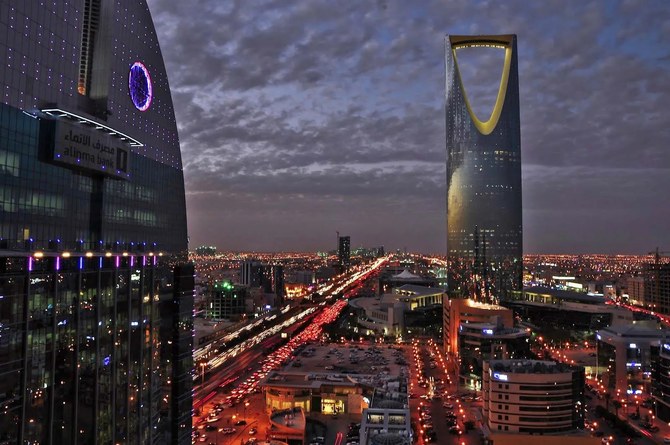
RIYADH: Saudi Arabia is on track to host the 28th World Association of Investment Promotion Agencies’ World Investment Conference from Nov. 25 to 27 in Riyadh.
The forum themed “Future-ready IPAs: Navigating digital disruption and sustainable growth,” will bring together leaders from investment promotion agencies, corporates, multilateral institutions, and other stakeholders to discuss global financial trends and opportunities, according to a statement.
The Kingdom’s selection as a host underscores its position as an international funding hub, according to Saudi Investment Minister Khalid Al-Falih.
“We are honored to be welcoming the global investment community to Saudi Arabia. Our strategic location at the crossroads of three continents, coupled with our world-class investment ecosystem and long-term political and economic stability, has seen the Kingdom develop into a global investment hub,” Al-Falih said.
“The World Investment Conference will serve as a platform to showcase our nation’s potential and forge partnerships that will shape the global investment landscape for years to come,” the minister added.
On WAIPA’s behalf, Executive Director and CEO Ismail Ersahin said: “WAIPA is honored that the 28th WAIPA World Investment Conference will be held in Riyadh, a city with a rich history and culture.”
Ersahin added: “With each edition, the WIC reaffirms its status as a guiding force for sustainable and inclusive development.”
He went on to stress how the conference is poised to be an impactful gathering aimed at the future readiness of IPAs.
Since 1995, the annual gathering has provided a forum for stakeholders to exchange insights and best practices and forge partnerships that drive economic development globally.
Human capital a ‘key challenge’ for Kingdom’s tourism sector, says Saudi minister
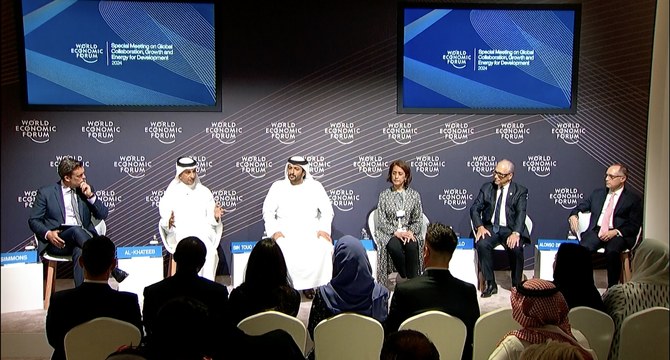
- Saudi Arabia's tourism sector is 'heading to achieve $80 billion this year' in private investment, Al-Khateeb told a WEF panel
LONDON: Developing human capital is a key challenge for Saudi Arabia’s travel sector, the country’s tourism minister has said on Sunday.
Ahmed Al-Khateeb, speaking during a two-day meeting of the World Economic Forum in Riyadh, discussed the Kingdom’s burgeoning tourism industry, which has boomed over the past half-decade.
To address the human capital challenge, the Saudi leadership has encouraged young people across the Kingdom “to join the sector,” he said.
“We are spending a lot to train (young Saudi talents) and scale them, and involve them in the sector,” he told the “Vacationomics” panel discussion, adding that hiring local experts is essential for delivering better tourism experiences.
“You get the best experience and you know more about other people’s culture and other nations’ cultures when you deal and interact with locals,” he said. “We want to make sure that our guests are served by local people.”
Saudi Arabia has delivered “strong growth in Q1 this year, and we are moving to deliver our 2030 numbers,” the minister said.
The Kingdom’s tourism sector “has come a long way” since the launch of the National Tourism Strategy as part of efforts to diversify the economy, Al-Khateeb said, adding that the industry is “heading to achieve $80 billion this year” in private investment.
Last year, Saudi Arabia attracted about $66 billion in private investment into tourism.
“We doubled the number of visitors coming from outside — 100 million in total … 77 million domestic (and) 27 million international,” he said. “This is double the number that we achieved before we launched our National Tourism Strategy.
“We have the funding. We have a great country. We have everything that the international tourists would like to see and experience.”
Jerry Inzerillo, chief of the Diriyah Gate Development Authority, told the panel: “What the Gulf and its leadership will do in the next 10 years is going to be breathtaking to allow people to come from all over the world.”
With “so much to do in the region,” Inzerillo said he believed the “warmth and hospitality” of the Saudi people is serving as a strong selling point for tourism in the Kingdom.
Though the traditional Gulf tourism market in Saudi Arabia is well developed, European tourism is “now activating” through new business with the Kingdom, he added.
“And as we sign more and more airline deals and… (the) Ministry of Tourism has done a brilliant job in getting bilaterals, you’ll see those numbers grow very exponentially.”
Other panelists included Abdulla Bin Touq Al-Marri, UAE minister of economy; Thiago Alonso de Oliveira, CEO of JHSF Participacoes; and Aireen Omar, president and CEO of RedBeat Capital.




